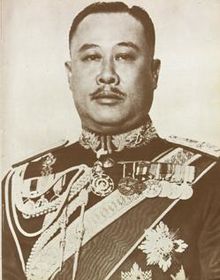Praphas charusathias
Praphas Charusathien ( Thai : ประภาส จารุ เสถียร , RTGS : Praphat Charusathian, pronunciation: [pràʔpʰâːt t͡ɕaːrúsàtʰǐan] ; * November 25, 1912 in Udon Thani ; † August 18, 1997 in Bangkok ) was a Thai army officer (most recently field marshal of the army), high commander (1963–73), several times deputy prime minister and longstanding interior minister under various military governments (1957–73).
life and career
He began his military training in 1933 at the Royal Chulachomklao Military Academy after the end of the absolute monarchy in Siam. Praphas became an infantry officer and was promoted by the later Field Marshal Sarit Thanarat . He quickly reached higher ranks.
In March 1957 he became Deputy Minister of the Interior in the Plaek Phibunsongkhram government, with the rank of major general . In the meantime promoted to lieutenant general, he resigned like his mentor Sarit in September of the same year and took part in his putsch against the government. In the subsequently installed government Pote Sarasin , he rose to the position of Minister of the Interior . In the same year he became chairman of the board of directors of Bangkok Bank , the largest commercial bank in the country - this position he held until 1973. When his friend Thanom Kittikachorn took over the government in January 1958 , he was also deputy prime minister. Under the government of Sarit (from 1959) he remained Minister of the Interior as well as after his death in 1963, when he again served as deputy to the new Prime Minister Thanom until 1973.
Between 1963 and 1973 Praphas was also supreme commander of the Thai army . During this time, he was the strong man who pulled the strings behind the Thanom Kittikachorn government during the Vietnam War and was known for dark financial deals and political intrigue. When Thanom carried out a coup d'état in November 1971 (although he was already head of government), repealed the constitution and dissolved parliament, Praphas became vice-chairman of the “National Executive Council,” which ruled the country with unlimited powers. In May 1973 Praphas was promoted to field marshal. At the same time, he was Deputy Commander in Chief of the Armed Forces, Commander in Chief of the Army, Chairman of the Anti-Communist Command (CSOC), Deputy Prime Minister, Minister of the Interior, Director General of the National Police, Deputy Chairman of the National Security Council and President of the Thai Boy Scouts.
Furthermore, Praphas was the chairman of the Olympic Committee of Thailand and played a central role in the spread of Western sports, related development policy and promotion of the personality cult of King Bhumibol.
Praphas had to hand over the high command of the land forces on October 1, 1973 to General Krit Sivara , which signaled a loss of importance. After all, he was still deputy prime minister and chairman of a constituent assembly , the work of which progressed very slowly and the conclusion of which was always postponed. As a result, there were more and more protests, which in October 1973 grew into a popular uprising against the military dictatorship with violent clashes between students and the security forces. The many civilians who died called King Bhumibol Adulyadej on the scene, whereupon Praphas and Thanom went into exile.
After the coup d'état in October 1976, Praphas returned to Thailand in January 1977, but he was no longer able to exercise political influence.
Praphas Charusathien died on August 18, 1997 in Bangkok.
annotation
- ↑ The first name is also written Prapas, Praphat, Prapass, the surname Charusathian or Charusathiara.
literature
- Michael Leifer: Dictionary of the modern politics of South-East Asia . London: Routledge 1996. Article: Praphas Charusathien . ISBN 0-415-13821-3 .
Individual evidence
- ^ Michael J. Montesano: Market Society and the Origins of New Thai Politics. In: Money and Power in Provincial Thailand. NIAS Press, Copenhagen 2000, p. 110.
- ↑ Krirkkiat Phipatseritham, Kunio Yoshihara: business groups in Thailand. Institute of Southeast Asian Studies, Research Notes and Discussions Paper No. 41, Singapore 1983, p. 24.
- ↑ Gen Praphas promoted to post of field marshal. In Nicholas Grossman (ed.): Chronicle of Thailand. Headline News since 1946. Edition Didier Millet, Singapore 2009, p. 190.
- ^ Stefan Huebner, Pan-Asian Sports and the Emergence of Modern Asia, 1913-1974. Singapore: NUS Press, 2016, Chapter 7 (on Praphas as a central sports organizer, development policy, the Cold War and the Asian Games of 1966 and 1970).
| personal data | |
|---|---|
| SURNAME | Praphas charusathias |
| BRIEF DESCRIPTION | Thai officer and politician, Minister of the Interior in Thailand (1957–1973) |
| DATE OF BIRTH | November 25, 1912 |
| PLACE OF BIRTH | Udon Thani |
| DATE OF DEATH | August 18, 1997 |
| Place of death | Bangkok |
